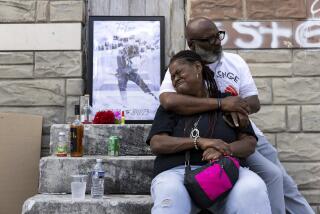Courage sustains a hate crime survivor
One bullet hit Ben Kadish in the hip and tore through his abdomen. Another crushed his thigh bone. He tried to crawl to a multipurpose room for cover, but his body wouldn’t get him there.
He still didn’t know he’d been shot.
How could a boy of 5 conceive of a world in which a stranger, filled with hate, would walk calmly into a community center filled with children and fire 70 rounds from a semiautomatic rifle, on a mission to kill Jews?
Kadish figured the loud noise and the commotion were part of a fire drill at the North Valley Jewish Community Center in Granada Hills, but nothing seemed to make sense. He remembers lying on his back, gazing up and fading out.
Paramedic Todd Carb and his partner, Danny Jordan, plowed out of Fire Station 87 in Northridge with only sketchy information about a shooting. When they arrived at the community center and realized children were inside, they charged into the building before getting police clearance.
The smell of gunpowder was sharp. Shell casings littered the lobby. Jordan went to the aid of the receptionist who’d been shot; Carb heard a woman screaming and hustled down a hallway to where she knelt next to Ben Kadish. Carb knew instantly that the boy was gravely injured.
“Don’t do that!” he ordered Ben, shaking him as the boy’s eyes rolled back.
By L.A. Fire Department rules, paramedics were supposed to call for a helicopter to transport a badly injured child to a pediatric trauma unit. But 19 years of experience told Carb there was no time.
“He’s not going to make it,” he told his partner.
They agreed the only hope was to get Ben to nearby Providence Holy Cross Medical Center, and they rushed him there within minutes.
“As they were stripping his clothes off I took one last look at him and truly thought that was the last time I’d ever see him,” recalled Carb, who is Jewish.
Today, as the 10-year anniversary of that rampage approaches, Ben Kadish is 15 and a solid 6 foot 3. He goes to movies, hangs at the mall with friends and will be a high school junior next month. He walks with a limp, but there is no other sign -- nothing physical, at least -- of the horror he endured on what had begun as a normal summer day.
Todd Carb is now in his 29th year of service, rolling under a wailing siren to rescue the sick and injured in a daily race against time. He’s the guy you hope to never see; the guy who can’t arrive fast enough when you need him. He does a job and moves on to the next, knowing the only way to survive is to not get involved, to not look back.
He’s made an exception, though, with the call that came on the morning of Aug. 10, 1999. Ben Kadish’s family believes that Carb’s quick decision helped save their son’s life, and they have been friends ever since, meeting at summer barbecues and other gatherings. Carb was at Ben’s bar mitzvah; he goes to Ben’s birthday parties. He’s watched the little boy who nearly died in his arms approach manhood.
“There’s a bond between us,” said Carb.
Ben calls Carb now and again just to say hello. Sometimes he’ll hear a siren and call the paramedic to ask what’s going on. Or he’ll ask again about the day he can’t fully remember but also can’t forget.
“He’s very curious to know everything that happened,” said Carb, who received a medal of valor for his actions that day. “I think that’s good. It helps him sort out the whole situation.”
But how can such a thing ever be sorted out?
“I still have nightmares,” Ben told me one day last week as if he needed to get it off his chest.
It’s the same each time. The killer is free, and he’s coming for him again.
When Buford O. Furrow Jr. of Washington state was done spraying bullets into the community center, where he wounded one adult, a teenage camp counselor and two more young children -- none of them hurt as badly as Kadish -- he drove to Chatsworth. There, he shot and killed postal worker Joseph Ileto because, he later said, he was a man of color (Filipino American) working for the federal government.
In the aftermath of the attacks, there were calls for stricter gun control laws and hate crime legislation. Prosecutors originally sought the death penalty for Furrow, who had American Nazi Party literature and a weapons cache in his van. But after learning about his long history of psychiatric treatment, they accepted a guilty plea and mandatory life prison term.
“I feel sorry for him,” Eleanor Kadish, Ben’s mother, said last week in the family’s Bell Canyon home.
Her husband, Chuck, was there, and Ben too, having a lunch of salad and pizza.
“I don’t feel sorry for him,” said Chuck. He allowed that Furrow might have had psychiatric problems but believes he’s where he belongs.
Mrs. Kadish said she wasn’t sorry for Furrow because he was locked up, but because he was consumed by hate that might have been passed on to him by parents or someone else. There’s still plenty of evil out there, she said, but she found hope in the makeup of the team of Holy Cross trauma doctors who saved Ben. One was Asian, one black, one of Middle Eastern descent.
It’s understandable that a loving mother would hang on to details like that, trying to bring a note of harmony to a disorderly and unpredictable world. She’s constantly telling Ben and his big brother, Josh, 19, that she loves them. When they leave the house, or sometimes even the room, there are “I love yous” all around.
It’s understandable, too, that Ben likes watching cop shows in which the bad guys always get caught and that he’s thought about becoming a prosecutor, among other things. At school, he is often drawn to the kids who don’t fit in. Maybe, as the victim of a hate crime, he’s better able to identify with those who are marginalized and targeted.
Ben bravely took me back through the day of his shooting and the long, painful ordeal that followed, with multiple surgeries and six weeks of hospitalization. He was in a wheelchair after that and had to learn to walk again, and his body bears scars that are permanent reminders of where he’s been, of his courage, of his lost innocence, of the sometimes random nature of violence.
He stopped himself early in the retelling, at the point where he’d been shot and couldn’t move. There was silence at the table as Ben dropped his head and wept. Eleanor and Chuck Kadish waited for their son to find his strength, as he has before, as they knew he would again.
And soon enough, he did. A growing boy with a healthy appetite, Ben asked his father to please pass the pizza.
--
More to Read
Sign up for Essential California
The most important California stories and recommendations in your inbox every morning.
You may occasionally receive promotional content from the Los Angeles Times.











